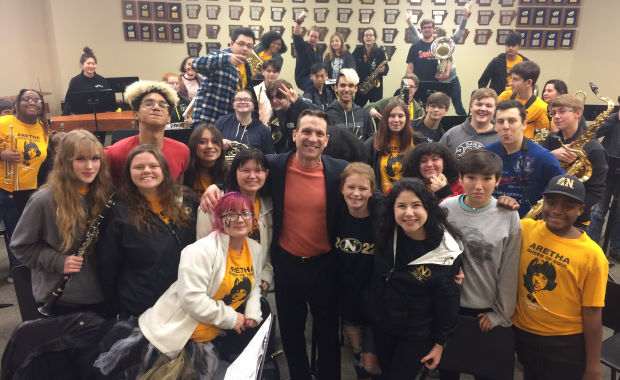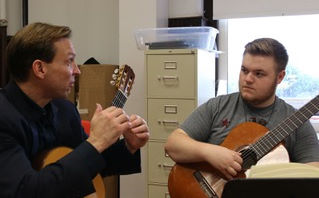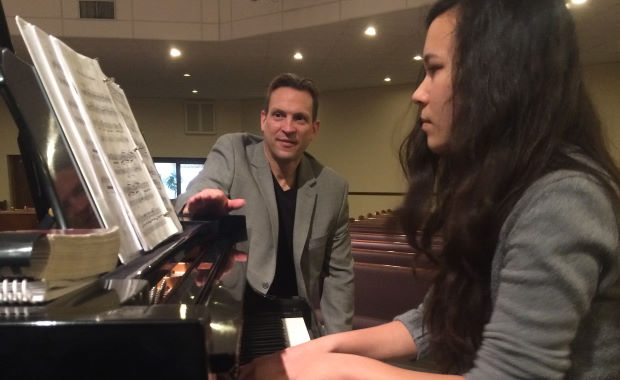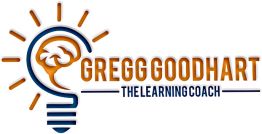What is it that allows those few people we know who perform so well to do that while most of us work hard and still have problems when we perform? The answer is in how we practice. You are getting good instruction, but the way we learn best in practice is very unusual and very few people know how to do it. Those that know and do it regularly are the ones we call talented and gifted, but anyone can do it. This is also the difference between stage fright anxiety and confident performance. When we have played something perfectly with ease many times in practice the performance becomes easy as well. Expression and enjoyment increase as technical difficulties melt away.
Practice coaching occurs weekly between lessons for 4 or 8 weeks in full support of the teacher’s, or your own, directions. We’ll find out how to best execute them for great lessons, and great progress. It is not open ended. Four to eight sessions are enough for lasting and ongoing improvement.
Sessions last from 50-60 minutes and will provide more than enough material to make every minute of the week’s practice filled with progress.
Your first session is guaranteed. You’ll make much more progress in one session and subsequent days than you ever have before. If not, then just send me an email and your entire payment will be refunded no questions asked. That is how well it works.
Unlike lessons, a few sessions is all you need for a lifetime of improvement.
For Any Instrument Including the Vocal One.
Practice Coaching is not open ended. The goal of this coaching is to make the coach obsolete and leave the student to guide their own development. This takes a matter of weeks not years.
It never takes more than eight weeks, and sometimes only four.
Even just one session will make a big difference in your performance. You’ll learn to do a few things you’ve never been able to do before (guaranteed), and get some tools you can apply to other challenges. Try this for a tune-up and supercharge for your work.
Four sessions will allow for the teaching of these principles over time so that the student can begin to apply them on their own.
Performance Level Development

Performance Development
At any level of development performance is usually a problem. We are really nervous, and don’t enjoy it. We see it as something to get through and hope that by the next time we’ll somehow be a better performer. We won’t because more of the same practice will get more of the same results. We know this when we walk onstage. It is not unreasonable to fear performing poorly when we know it is likely to happen.
The solution is changing the way we practice.
Read More...
If we solve all of those problems well before the day of the performance there is little to worry about when we walk onstage. When our hands/voice respond the way we want the nerves dissipate, and all that is left is the joy of performing music.
The answers are in cognitive science link to my learn more page They are so effective that your performance will improve dramatically in one session. Guaranteed.

Recital / Competition Development
As motivated and interested students of music we want to prepare the best performance possible. Yet it is the case, for most of us, that we struggle with playing many sections of our music. We are even working of them on the day of our performance! If we are hoping for a breakthrough on the day of the performance, after we’ve been working on something for weeks or months, we will likely be disappointed (and usually are).
Read More...
The way learning to perform really works, is very different than the way most of us think it does. The few that figure this out and do it regularly seem gifted and talented, but anyone can do it. The answers are in cognitive science and can be learned by anyone. Unfortunately, most teachers don’t know how to teach this. Cognitive science is not taught in our schools of education in any meaningful way. Here is how it works.
In a short period of time you can exceed your best expectations for recitals and competitions, and enjoy your performances. The results are guaranteed.

Virtuosity Development
Perhaps you are one of the few who have been able to figure out how to practice well. You’ve done weird things like using contextual interference and retrieval practice even if you don’t know the formal names for them. Yet, the final level of virtuosity eludes you. What more is necessary?
Things like understanding neurobiological latency and how to dramatically increase skill by
Read More...
mitigating this are what is needed. For instance; the time it takes a nerve impulse (action potential) to get from your finger to your brain and then for the brain to send the signal for the next movement back is about sixteenths at quarter note 120bpm. Have we noticed a speed barrier around that level for certain things? Having strategies to deal with these things raises our performance to the final level.
Find the next or final level in your virtuosity development. The results are guaranteed.
Stage fright, what is it? What can be done about it?
A vast majority of folks experience such discomfort playing live that it affects their performance, or at least makes performing unpleasant – something to get through rather than enjoy.
Of course, anxiety disorders are a real thing and one should seek diagnosis if a clinical problem is suspected. The National Institute of Mental Health estimates that 10-15% of Americans have a diagnosable anxiety disorder. In my teaching and performing life stage fright anxiety has affected nearly everyone I know including myself, and in many cases only when performing music. I’ve known people who can teach in front of classes but be super nervous when they perform, teach private lessons with ease, but fall apart when playing in lessons with their teacher, speak in front of large groups about subjects they know such as music education or business with ease, but suffer in music performance. As such this would make stage fright a Social Anxiety Disorder with a specifier for music performance only. This is one of numerous kinds of anxiety disorders, so it should show at less than 10-15%. This is far less than the numbers we see for stage fright. What is going on?
Read More...
What if we’ve missed something in our preparation? Not time, or honest desire, or dedication, we have all of that. But have we tried everything in the WAY we practice?
I found, quite by accident, that by learning how to truly play everything the way we want and making it feel easy weeks before our performance made the nerves just go away. Sure, folks were nervous when they walked on stage, but it went away as soon as their hands/voice/mouth, almost magically, did everything nearly perfectly with ease. I first heard of this years ago when a 13-year-old student I was working with had to play in a prestigious competition on viola even though he was a violinist (and also preparing a Mozart concerto on the violin for the same festival). After the competition, for which there was only one prize and one honorable mention (he got the honorable mention) he said to me, “Something weird happened, I wasn’t nervous.”
In any case, learning to practice so well that everything feels easy when we perform cannot hurt. The first session is guaranteed, so if you don’t think it will work after that you will receive a full refund no questions asked. Just send an email.
You will likely end up like one of these people who thought their nerves would never go away no matter what they tried. . .
I’ve never been able to express myself when I get up on the stage. Now I’m not nervous so I can let the emotion come through and that makes performance really fun.
Mikela R, Violin Student, Pacific University – Oregon
That is going to stick with me forever and it is the reason the “difficult” passages are no longer stressful (once practiced the right way). . .Again, thank you from the bottom of my heart.”
Joe K, Cello Performance Major, Florida State University
(Now) there is the feeling of your technique cooperating with you. . .it feels better, it feels so much musical and expressive. If all of your attention is going to struggling to make it (work) that never feels good, and that’s where a lot of musicians and students live a lot of the time.
It really surprised me how quickly it takes effect.
It was life altering for me. It’s something I’ve been looking for for years.
Nat H, Professional touring guitar and oud player, Teacher, United States
. . .but honestly, if you get the practice right you won’t have the nerves when you’re performing because you’ll have gotten the practice right in the first place.
Mike M, Guitarist and Teacher, United Kingdom
“ Oh yeah, I totally had the wrong viewpoint. I was working myself into a frenzy over practicing enough, the (problem) is I wasn’t fixing anything! . . I didn’t really have the tools to make that work.
I’ve seen such a difference in my own music already I feel like I’ve won! I really feel like I’ve won already, and I haven’t taken the exam. I’ve got two months to go! I’m really pumped.
I’m just so thankful, this is the best thing I’ve ever done, and I’ve done a lot of good things for myself in this whole process, but this is (what I was missing). ”
Classical piano student and Teacher preparing for upper level RCM exams
Canada
“ With these techniques the practice time kind of isn’t the issue. I’m not shooting to practice for an hour or two hours, even though I often do cause I’m having a good time (now). Now it’s ‘I want to accomplish this, and this is how I do it, and the amount of time that it actually takes to do this is a lot less. . .because you go through a process of getting the song down and getting it into your long term memory.
I do it every day. It makes me so happy. It’s kind of been a dream of mine for a long time, so it’s one of the biggest things in my life right now. I love it, I really love it! ”
Student of multiple instruments including guitar and voice
United States
“ It made a huge difference to my playing in quite a short while. . .also it made a difference to my confidence.
That’s another thing. I used to think I haven’t got enough time to practice, but I’ve found that actually by doing the things that (Gregg) suggested I got loads more out of my practice time, and I’ve made far more progress than I would have thought considering the comparatively small amount of practice time I’ve had.
Without a doubt practicing is probably the hardest skill you’ll ever learn as a musician. Some people think it might be performance or performance nerves, but honestly, if you get the practice right you won’t have the nerves when you’re performing because you’ll have gotten the practice right in the first place. ”
Guitarist and Teacher
United Kingdom
“ I’ve had the good fortune to study with a lot of the top musicians in the kind of music I play, but I couldn’t find anybody to help me break through those plateaus.
(Now) there is the feeling of your technique cooperating with you. . .it feels better, it feels so much musical and expressive. If all of your attention is going to struggling to make it (work) that never feels good, and that’s where a lot of musicians and students live a lot of the time.
It really surprised me how quickly it takes effect.
It was life altering for me. It’s something I’ve been looking for for years. ”
Professional touring guitar and oud player, Teacher
United States
“ Now, with Gregg, the practice is deliberate practice. . .I’m actually having more fun because I’m taking a piece I’m working on and I am acting like a kid again actually.
. . .when I get to the performance part of it I pull it back to the way it should be and play it through and it’s so much easier. I have the focus, I know what’s going on. . .it’s a lot easier.
The niche that he has placed himself inside the musical community, and through his online teaching anybody in the world can get access to him. . . ”
Classical Guitar Student
“ I’ve been studying keyboards for 20 odd years, and I haven’t developed much.
Now unfortunately, not to labor it, but I’ve got Parkinson’s disease. . .but overall it’s no good saying, “I’ve got Parkinson’s and therefore I’m never going to improve,” THAT is what I wasn’t willing to say. And that is the very reason I chose to (study with Gregg).
I got to the stage where that little voice kept appearing ‘you’ve never going to do this, you’re never going to play the piano. Why do you keep going? Why do you put this time and effort in. . .because today, today I feel different everyday about my piano.
I’ve got something that shows positive results when I apply them, and things get better.
You’re talking about a matter of a few weeks in a period of frustration that’s lasted years.
It’s given me inspiration in a way that I think I’d lost; I think I’d just about lost it. I still kept going, but I didn’t have the passion, I didn’t have the fire. It’s back! I can’t leave the piano alone. ”
Piano Student
